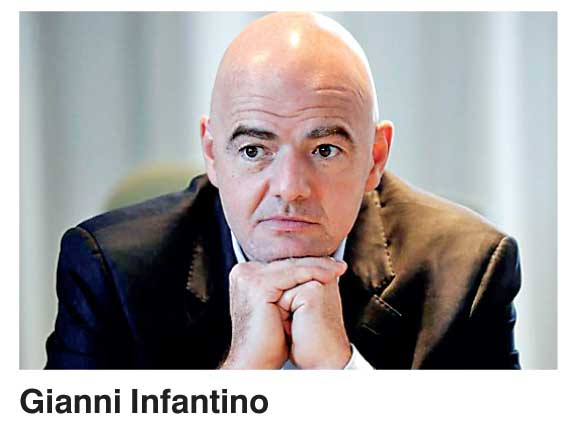Sunday Feb 22, 2026
Sunday Feb 22, 2026
Monday, 9 January 2017 01:05 - - {{hitsCtrl.values.hits}}
 Reuters: FIFA is set to ignore the old adage about not messing with a winning formula by approving president Gianni Infantino’s plans to expand the World Cup.
Reuters: FIFA is set to ignore the old adage about not messing with a winning formula by approving president Gianni Infantino’s plans to expand the World Cup.
The 37-member FIFA Council, which makes strategic decisions for soccer’s governing body, will on Tuesday decide whether to increase the tournament from the current 32 teams to either 40 or 48, starting in 2026.
Infantino, elected last February to replace the disgraced Sepp Blatter, pledged during his campaign to enlarge the tournament - a promise designed especially to appeal to the bulk of FIFA’s 211 member associations that rarely or never qualify for World Cups.
Infantino now says he has “overwhelming support” for his plans.
The Council’s nine European representatives seem least likely to support the change.
A spokesman for the European governing body UEFA offered little enthusiasm, saying it was “currently gathering feedback from its national associations – which are the ones directly impacted by any change”.
The association representing Europe’s most powerful clubs, already struggling to nurse players through long domestic seasons, last month wrote to Infantino to say that that “politics and commerce should not be the exclusive priority in football”.
But even if the Europeans oppose the expansion, Infantino’s comment suggests they will be in a minority.
Tried and tested
Critics say it would be wrong to change a 32-team format that, in 2014 in Brazil, produced a tournament of exhilarating football, unpredictable results and few meaningless or hopelessly one-sided matches.
German football boss Reinhard Grindel said on Thursday that FIFA should stick to its “tried and tested formula”, and that all of the possible alternatives had “considerable weaknesses”.
Infantino has said his preferred option is for a 48-team tournament that would start with 16 groups of three teams, where the top two would qualify for a knock-out round of 32.
“For this alternative, the draw would probably have to be abolished to avoid tactical behaviour in final group matches,” said Grindel.
“But having extra-time and penalties in the group stage is itself problematic, adding organisational difficulties to an already higher number of matches.”
Infantino has also proposed a preliminary round of 16 knockout ties, with the winners joining 16 seeded teams in a 32-team group phase.
“This would lengthen the tournament by one week for half of the participating teams, and considerably increase the burden on the players,” Grindel warned.
There are also two proposals for a 40-team World Cup - the first featuring eight groups of five teams in the first round; and the second with 10 teams of four, where the group winners and six best runners-up would progress.
Grindel said the first choice would lead to “a large number of matches where teams would be just playing for pride”, and the latter could leave some second-placed teams waiting for up to four days to find out whether they had qualified.
“Past World Cups have always been tournaments that have enthused players, spectators and sponsors alike,” he said. “So why change it?”